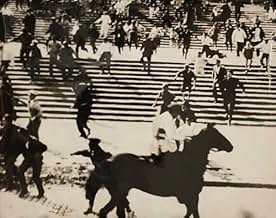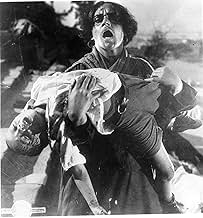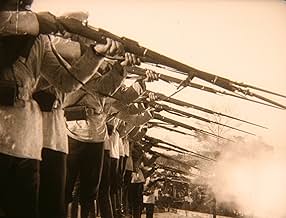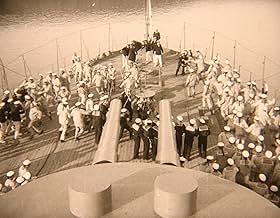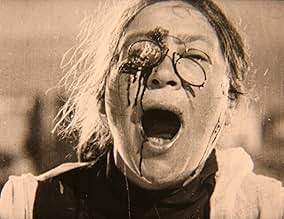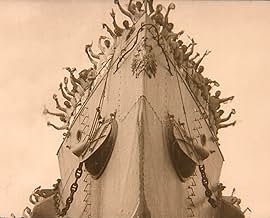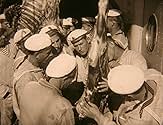Nel mezzo della Rivoluzione Russa del 1905, l'equipaggio della nave da guerra Potemkin si ammutina contro il regime brutale e tirannico degli ufficiali di servizio sulla nave. Ne consegue un... Leggi tuttoNel mezzo della Rivoluzione Russa del 1905, l'equipaggio della nave da guerra Potemkin si ammutina contro il regime brutale e tirannico degli ufficiali di servizio sulla nave. Ne consegue una manifestazione per le strade di Odessa che sfocia in un massacro da parte della polizia.Nel mezzo della Rivoluzione Russa del 1905, l'equipaggio della nave da guerra Potemkin si ammutina contro il regime brutale e tirannico degli ufficiali di servizio sulla nave. Ne consegue una manifestazione per le strade di Odessa che sfocia in un massacro da parte della polizia.
- Regia
- Sceneggiatura
- Star
- Premi
- 1 vittoria in totale
- Young Sailor Flogged While Sleeping
- (as I. Bobrov)
- Woman With Pince-nez
- (as N. Poltavtseva)
- Student
- (as Brodsky)
- Odessa Citizen
- (as Sergei M. Eisenstein)
- Recruit
- (as A. Fait)
Riepilogo
Recensioni in evidenza
'Potyomkin' is a film that NEEDS to be seen as one entity, not to be picked at. Don't just watch those clip shows where they only present the 'Odessa steps' sequence and then move on to 'Citizen Kane' or 'The Godfather', see it all in it's glorious 75-minute running time to really understand and enjoy it. Don't expect every infinitesimal detail to be perfect though, I mean the acting of the '20s silent era makes 'Scooby Doo' look like a master of understated realism, certain plot points may seem illogical and some of the battle sequences look dated, but it is still an immensely enjoyable movie.
The most memorable moments in the film are the mutiny on the battleship, Vakulinchuk's body falling off the ship, the sailor under the tent at the end of the pier, the mother holding her dead child, the baby carriage on the Odessa steps and the lion rising up to roar as further carnage ensues. For each new pair of eyes that look upon it, 'The Battleship Potemkin' comes alive once again.
"Bronenosets Potyomkin" is one of these movies, and it should be on anyone's list looking to learn more about the history of cinema.
Grigori Aleksandrov & Sergei M. Eisenstein directed this groundbreaking film that documents the horrors taking place on a Russian battleship. When the sailors finally retaliate against their superiors, the locals embrace the them, and support them. Things get ugly when a group of soldiers are sent to the small town to take care of business. What follows is one of the most imitated scenes in the history of cinema. Anyone who has seen "The Untouchables", and "Bronenosets Potyomkin" knows exactly what I mean.
Overall I think this movie raised the bar for film making just as "Intolerance" did a few years earlier. If you do not mind silent films, do yourself a favor, and see "Bronenosets Potyomkin".
If you don't like silent films..... watch "Bronenosets Potyomkin" anyway.
Montage, which was not just Eistenstein's knack but also his life's blood early in his career, is often misused in the present cinema, or if not misused then in an improper context for the story. Sometimes montage is used now as just another device to get from point A to point B. Montage was something else for Eisenstein; he was trying to communicate in the most direct way that he could the urgency, the passion(s), and the ultimate tragedies that were in the Russian people at the time and place. Even if one doesn't see all of Eisenstein's narrative or traditional 'story' ideas to have much grounding (Kubrick has said this), one can't deny the power of seeing the ships arriving at the harbor, the people on the stairs, and the soldiers coming at them every which way with guns. Some may find it hard to believe this was done in the 20's; it has that power like the Passion of Joan of Arc to over-pass its time and remain in importance if only in terms of technique and emotion.
Of course, one could go on for books (which have been written hundreds of times over, not the least of which by Eisenstein himself). On the film in and of itself, Battleship Potemkin is really more like a dramatized newsreel than a specific story in a movie. The first segment is also one of the great sequences in film, as a mutiny is plotted against the Captain and other head-ups of a certain Ship. This is detailed almost in a manipulative way, but somehow extremely effective; montage is used here as well, but in spurts of energy that capture the eye. Other times Eisenstein is more content to just let the images speak for themselves, as the soldiers grow weary without food and water. He isn't one of those directors who will try to get all sides to the story; he is, of course, very much early 20th century Russian, but he is nothing else but honest with how he sees his themes and style, and that is what wins over in the end.
Some may want to check it outside of film-school, as the 'Stairs' sequence is like one of those landmarks of severe tragedy on film, displaying the ugly side of revolution. Eisenstein may not be one of the more 'accessible' silent-film directors, but if montage, detail in the frame, non-actors, and Bolshevik themes are your cup of tea, it's truly one of the must sees of a lifetime.
Lo sapevi?
- QuizThe film censorship boards of several countries felt this movie would spread communism. France imposed a ban after a brief run in 1925; it lifted it in 1953 after the death of Russian leader Joseph Stalin. The UK banned it until 1954.
- BlooperIn the Imperial squadron near the end of the film, there are close-ups of triple gun turrets of Gangut-class dreadnought. It possibly was made this way to show the power of Imperial fleet, but battleships of 1905 were much smaller pre-dreadnoughts, with twin turrets only, just like "Potemkin". "Ganguts" entered service in 1914.
- Versioni alternativeSergei Eisenstein's premiere version opened with an unattributed quote from Leon Trotsky's "1905": The spirit of mutiny swept the land. A tremendous, mysterious process was taking place in countless hearts: the individual personality became dissolved in the mass, and the mass itself became dissolved in the revolutionary impetus. This quote was removed by Soviet censors in 1934, and replaced by a quotation from V.I. Lenin's "Revolutionary Days": Revolution is war. Of all the wars known in history, it is the only lawful, rightful, just and truly great war...In Russia this war has been declared and won. The original text was restored in 2004.
- ConnessioniEdited into Seeds of Freedom (1943)
I più visti
- How long is Battleship Potemkin?Powered by Alexa
Dettagli
- Data di uscita
- Paese di origine
- Lingue
- Celebre anche come
- Battleship Potemkin
- Luoghi delle riprese
- Sevastopol, Crimea, Ucraina(battleship scenes)
- Azienda produttrice
- Vedi altri crediti dell’azienda su IMDbPro
Botteghino
- Lordo Stati Uniti e Canada
- 51.198 USD
- Fine settimana di apertura Stati Uniti e Canada
- 5641 USD
- 16 gen 2011
- Lordo in tutto il mondo
- 61.389 USD
- Tempo di esecuzione1 ora 15 minuti
- Colore
- Mix di suoni
- Proporzioni
- 1.33 : 1
Contribuisci a questa pagina



